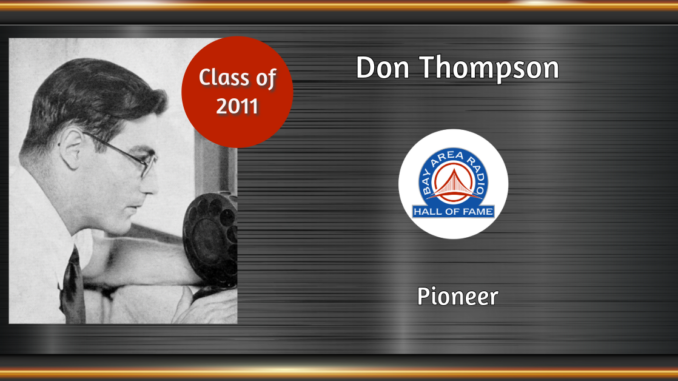
Don Thompson was born in Rangoon, where his mother was a medical missionary in charge of the American hospital. His father was a captain in the U.S. Navy. When Don was 3, the family returned to the United States, where Thompson would become a star athlete.
After graduating from the University of Redlands, Thompson played guard for the 1926 Los Angeles Buccaneers, a National Football League team that scheduled no home games. One of Thompson’s linemates was Cal football legend Brick Muller.
In 1928, Thompson joined KPO as a writer and announcer. His break came at San Francisco’s Kezar Stadium when the broadcaster assigned to call the East-West Shrine game failed to show up. Thompson was thrust into duty, with legendary announcer Graham McNamee in the same broadcast booth.
His performance that day led to a busy play-by-play schedule from the late 1920s into the 1930s. Thompson called many games sponsored by Associated Oil, which created a West Coast network to carry college football games.
Thompson hosted a daily sports roundup program at KPO and served as the radio voice of the Rose Bowl game for several years. He also broadcast Pacific Coast League baseball games.
Thompson earned a loyal following. In January 1932, the Oakland Post-Enquirer‘s J. E. Doyle lobbied for the veteran sportscaster, writing “If Don Thompson isn’t announcing the big games back east next fall, broadcasting company executives are not honestly seeking real talent.”
Thompson would become one of those executives, serving NBC as a director and announcer of special events. He was involved in numerous remote broadcasts, including a series of 1936 reports from Alaska. Thompson flew aboard a specially-equipped Lockheed Electra, bouncing a shortwave signal from the plane to the RCA receiving station at Point Reyes, from which the broadcast was distributed over the NBC network.
Thompson was called to active duty in the Navy in 1941 just before the outbreak of World War II. He would return to work for NBC in Los Angeles after the war.
